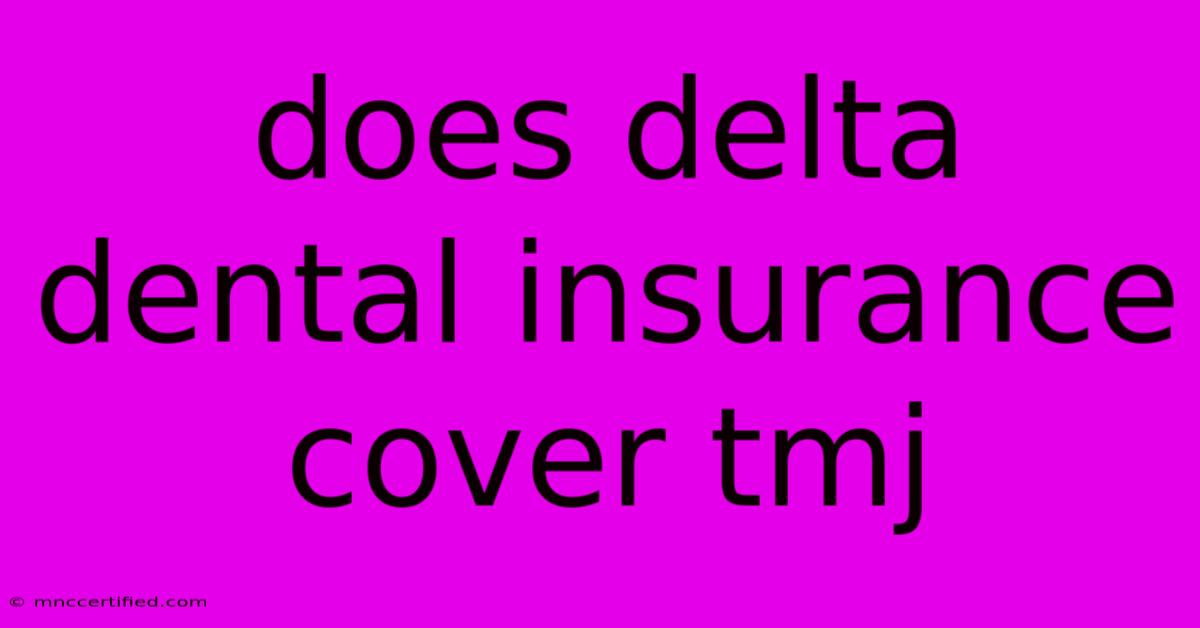Does Delta Dental Insurance Cover Tmj

Table of Contents
Does Delta Dental Cover TMJ Treatment? A Comprehensive Guide
Temporomandibular joint disorder (TMJ) can be a painful and debilitating condition that impacts your daily life. If you have Delta Dental insurance, you may be wondering if it covers TMJ treatment. The answer isn't always straightforward, and it depends on several factors. Let's break down what you need to know.
Understanding TMJ and Dental Insurance Coverage
What is TMJ?
TMJ refers to the joint that connects your jawbone to your skull. When this joint becomes inflamed or misaligned, it can cause a variety of symptoms, including:
- Pain in the jaw, face, and neck
- Clicking or popping sounds in the jaw
- Limited jaw movement
- Headaches
- Earaches
Dental Insurance Coverage for TMJ
Dental insurance policies can vary widely, and coverage for TMJ treatment is not always guaranteed. Here's what you need to consider:
-
Specific Plan Coverage: Carefully review your Delta Dental plan details. Look for any mentions of TMJ, temporomandibular disorders, or related conditions. Check for covered treatments like:
- Occlusal splints (mouth guards): Often the first line of treatment for TMJ.
- Physical therapy: May be covered to help improve jaw muscle function.
- Medications: Pain relievers, muscle relaxants, and anti-inflammatories are sometimes covered.
- Surgical procedures: In severe cases, surgery may be necessary, but coverage is usually limited.
-
Pre-existing Conditions: Some dental insurance plans may exclude coverage for pre-existing conditions, including TMJ.
-
Exclusions and Limitations: Be aware of any exclusions or limitations in your plan, such as:
- Coverage limits: Your plan might have a maximum amount it will cover for TMJ treatments.
- Copayments and deductibles: You may be responsible for a portion of the cost.
- Prior authorization: Some procedures may require prior authorization from Delta Dental.
Tips for Maximizing Coverage
- Contact Delta Dental: Reach out to your dental insurance provider directly. They can provide specific information about your plan's coverage for TMJ treatment.
- Get a Diagnosis: See a qualified dentist or oral surgeon specializing in TMJ disorders. They can properly diagnose your condition and recommend the most appropriate treatment.
- Explore Treatment Options: Discuss all available treatment options with your doctor, including those covered by your insurance plan.
- Seek Pre-Authorization: If a specific procedure requires it, be sure to obtain pre-authorization from Delta Dental to avoid unexpected out-of-pocket costs.
Alternative Payment Options
If your Delta Dental plan doesn't fully cover TMJ treatment, consider these options:
- Health Insurance: Some health insurance plans may cover certain aspects of TMJ treatment, particularly if it's deemed medically necessary.
- Flexible Spending Account (FSA) or Health Savings Account (HSA): You can use pre-tax funds from these accounts to pay for qualified medical expenses, including TMJ treatment.
- Payment Plans: Your dentist may offer payment plans or financing options to help manage the cost of treatment.
Conclusion
Knowing your Delta Dental plan's coverage for TMJ is crucial. By understanding your policy, seeking a proper diagnosis, and exploring alternative payment options, you can navigate the costs associated with TMJ treatment and get the care you need. Remember, early intervention and comprehensive treatment can significantly improve your quality of life and reduce long-term complications.

Thank you for visiting our website wich cover about Does Delta Dental Insurance Cover Tmj. We hope the information provided has been useful to you. Feel free to contact us if you have any questions or need further assistance. See you next time and dont miss to bookmark.
Featured Posts
-
Andover Road Closures Upcoming Remembrance
Nov 10, 2024
-
Who Normally Pays For Title Insurance
Nov 10, 2024
-
Pakistan Dominates Australia 8 Wicket Win
Nov 10, 2024
-
Sea Harbor Insurance Customer Service
Nov 10, 2024
-
Pak Vs Aus Pakistan Claims Series Victory
Nov 10, 2024